40 james lange theory diagram
First proposed by American psychologist James [] and independently developed by Danish psychologist Lange [], the James-Lange theory of emotion states that the immediate, primary cause of an emotion is physical.Bodily changes and physiological processes, which occur as a result of environmental stimuli, evoke certain feelings in the conscious mind. James-Lange theory The James-Lange theory of emotion , proposed by William James and Carl Lange, is the opposite of the Cannon-Bard theory . This theory states that an individual has a physiological response to a stimulus first, and then experiences an emotion based on his or her perception of the physiological response.
The James-Lange theory of emotion asserts that emotions arise from physiological arousal. Recall what you have learned about the sympathetic nervous system and our fight or flight response when threatened. If you were to encounter some threat in your environment, like a venomous snake in your backyard, your sympathetic nervous system would ...
:max_bytes(150000):strip_icc()/ScreenShot2018-06-05at2.15.47PM-5bbb7b8a46e0fb00519d2f5d.png)
James lange theory diagram
They sound the same to me According to James-Lange, people are afraid of a predatory animal because the perception of one is associated with specific reactions of the body (e.g. escape or ago- nistic behavior and/or being ... The James-Lange Theory. The earliest studies into emotion were introduced simultaneously but independently by William James and Carl Lange. They came up with the same idea at the same time, around ...
James lange theory diagram. The James Lange theory of emotion states that emotion is equivalent to the range of physiological arousal caused by external events. The two scientists suggested that for someone to feel emotion, he/she must first experience bodily responses such as increased respiration, increased heart rate, or sweaty hands. Directions: Label the circuit diagram of how the amygdala may modulate memory storage in the figure below. a) James-Lange theory (b) Modern emotional theory . Back to memory storage areas, including the cortex, basal ganglia, and hippocampus Amygdala . To cortex and basal ganglia James and Lange believed that the physical responses, (sweating, shallow breathing, tight chest, etc.) must be present in order to be truly feeling an emotion. Due to the similarities in James' and Lange's work, this theory was named the James-Lange Theory. It was the prevailing theory on emotions throughout the late 18th century. Could someone please explain these two theories of emotion and provide an example? Thanks!
James-Lange theory of emotion: emotions arise from physiological arousal. polygraph: lie detector test that measures physiological arousal of individuals as they answer a series of questions. Schachter-Singer two-factor theory of emotion: emotions consist of two factors: physiological and cognitive Walter B. Cannon, "The James-Lange theory of emotions: A critical examination and an alternative theory," 1927, 39, 106-124. Walter Cannon's article on the James-Lange theory of emotions was an attack on the fundamental notions of emotion held by most psychologists since its postulation by William James in 1884 and by C. G. Lange in 1885. An example of functionalist thinking can be found in James' view of emotions (the James-Lange theory): Our natural way of thinking about these standard emotions is that the mental perception of some fact excites the mental affection called the emotion, and that this latter state of mind gives rise to the bodily expression. The theory states that emotions are experienced at the end of a chain of events, beginning with physiological changes, followed by the cognitive attribution of the source of those changes, and finally the emotion itself. This theory builds upon the James-Lange theory by accounting for the potential ambiguity when experiencing physiological ...
The James-Lange theory of emotion asserts that emotions arise from physiological arousal. Recall what you have learned about the sympathetic nervous system and our fight or flight response when threatened. If you were to encounter some threat in your environment, like a venomous snake in your backyard, your sympathetic nervous system would ... The James-Lange theory is a hypothesis on the origin and nature of emotions and is one of the earliest theories of emotion within modern psychology. It was developed by philosopher John Dewey and named for two 19th-century scholars, William James and Carl Lange (see modern criticism for more on the theory's origin). The basic premise of the theory is that physiological arousal instigates the ... I hate these goddamn emotional theories so much. As far as I know, James-Lange says that a stimulus happens, you have a physical response, and you then experience an emotion based on your interpretation of the physiological reaction. Schacter-Singer says that a stimulus happens, you have a physical response, and then you cognitively appraise that response and associate it with an emotion. I don't really understand the difference. Why do I even need to remember this bruh
1 Lange, like James, announces this theory as a new discovery. The motive and method of his investigation were, however, dif-ferent from James'; he worked, in the interest of practical medicine, from the side of objective 'expression.' 2 He dif-fers from James also in that he refers to earlier writers who
Alright, so nobody can explain the nature of the big bang, why the universe is expanding, etc. Here's my nutjob theory that's been in my head for about a year now: [So this is the best I could do with my bad art skills, represented in 2d](https://i.imgur.com/vZafR3Z.png) Basically, I think our universe is the result of a 4d hypersphere passing through an area of 3d space. This could explain the nature of our universe constantly expanding, we're just still on the 1st "half" of the sphere. Event...
The James-Lange theory has been somewhat controversial—when writing about his theory, James acknowledged that many other researchers took issue with aspects of his ideas. One of the most well-known critiques of the James-Lange theory is the Cannon-Bard theory, put forward by Walter Cannon and Philip Bard in the 1920s.
The bodily sensation prepares us for action, as in the Fight-or-Flight reaction. Emotions grab our attention and at least attenuate slower cognitive processing. This is not a new theory and was proposed in 1884. It combined the ideas of William James and Danish physiologist Carl Lange, who largely independently arrived at the same conclusion.
I thought I understood the theories of emotion, but now I'm confused. Can somebody please weigh in to settle whether or not the JL theory includes an element of interpretation of physiological response? Khan Academy says it does, AAMC seems to say it doesn't, I find multiple differing sources everywhere. Here is the question: How would the James–Lange theory of emotion explain the aggressive emotions experienced by the participants in the experimental condition? Participants experience physio...
TLDR: [the function of the colored lights](https://i.imgur.com/o1TYD1l.jpg) ------------------ Most of you have heard of general relativity and that when something travels near the speed of light, that time inside the craft will pass slower relative to outside of it, space gets distorted, etc. ([heres an example of such distortions](https://youtu.be/73Mh88wMp3g?t=469)). Now imagine reality is even more relative than we think, perhaps fundamentally relative to an observer. Maybe this involves ot...
In a pre chapter excerpt (82), when talking about the death rattles in WoR, he finishes by writing "but no, this is a distraction, deviation, kingship. We must discuss the nature of kingship." Is it possible that "the nature of kingship" is a mistranslation of "the way of kings" and if so, how does it relate to the diagram or Taravangians plan? Is it referencing gavilars "the most important words a man can say"? Idk if this was already discussed, thought it was a possible interesting connection ...
One of the early theories proposed by researchers was known as the James-Lange theory of emotion. 1. Proposed independently by psychologist William James and physiologist Carl Lange, the James-Lange theory of emotion suggested that emotions occur as a result of physiological reactions to events. In other words, this theory proposes that people ...
James-lange theory: Emotions are involuntary. Why might an explanation of emotional experience solely in terms of the autonomic nervous system be questioned? - Autonomic NS is difficult to feel sometimes, you can't control it, it just happens. - It can't just be the stimulus that produces an autonomic emotion.
TLDR: [the function of the colored lights](https://i.imgur.com/o1TYD1l.jpg) ------------------ Most of you have heard of general relativity and that when something travels near the speed of light, that time inside the craft will pass slower relative to outside of it, space gets distorted, etc. ([heres an example of such distortions](https://youtu.be/73Mh88wMp3g?t=469)). Now imagine reality is even more relative than we think, perhaps fundamentally relative to an observer. Maybe this involves ot...
psychology - James lange theory of emotion. Summarise the theory AO1. explain the event part. explain the arousal. explain the interpretation. Event, arousal, interpretation, emotion. A particular event, such as a stressor or threat in the enviro…. Adrenaline is released, causing physiological arousal.
James-Lange Theory. The James-Lange theory of emotion was proposed by psychologists William James and Carl Lange. According to this theory, as we experience different events, our nervous system develops physical reactions to these events. Examples of these reactions include increased heart rate, trembling, upset stomach, etc.
The James-Lange theory is a counter-intuitive approach, contrasting with conventional wisdom related to the cause and effect of emotions and their manifestation. Both scientists emphasized that the autonomic activity and the actions that are induced by an external stimulus generate the feeling of an emotion, not the other way around.
The elaboration likelihood model (ELM) of persuasion is a dual process theory describing the change of attitudes. The ELM was developed by Richard E. Petty and John Cacioppo in 1980. The model aims to explain different ways of processing stimuli, why they are used, and their outcomes on attitude change.
The Schacter-Singer theory draws on elements of both James-Lange theory and Cannon-Bard theory, proposing that physiological arousal occurs first but that such reactions are often similar for different emotions. The theory suggests that the physiological reactions must be cognitively labeled and interpreted as a particular emotion.
Yuri Landman (born 1 February 1973) is a Dutch inventor of musical instruments and musician who has made several experimental electric string instruments for a number of artists including Lee Ranaldo of Sonic Youth, Liars, Jad Fair of Half Japanese, Liam Finn, and Laura-Mary Carter.Besides his musical activities he is also a graphic novel artist
02.01.2022 · Speaking of hosts, doesn't it get awkward to have your photos taken by paps with your beard while your boyfriend has to stay for the most pa...
To make you get the basic picture of what I'm out after h[ere's a simple example of a Venn diagram](https://www.houseofmaths.co.uk/wp-content/uploads/2017/04/Venn-Diagram-three-circles.jpg). I would like to do this but Ace Attorney is related. You choose the basic sections, like woman, cartoon, and human, in the example (it can be more than three). If you want you can also choose some of the values to be put into the premises, like John Venn and Peppa Pig in the example. The premises could be a...
05.03.2021 · Learn about the Nursing Need theory of nurse theorist Virginia Henderson in this nursing theories guide!Get to know also Henderson’s biography, career, and works that helped shape nursing. The second section will explain the major concepts, the nursing metaparadigm, subconcepts, components, and assumptions of Henderson’s Nursing Need theory.
Dude, I’ve tried everything and he’s the only person I can’t beat I’ve tried blocking more then hitting, aiming for his stomach, and everything and I can’t beat him.
James-Lange theory - This theory explains that a stimulus triggers activity in our body, which then produces an emotional experience in our brain. For example, in the diagram below, the sight of the on-coming car first causes the subject to experience a pounding heart (arousal), and then they experience fear (emotion).
The James-Lange theory argues that the blood pressure and breathing changes would lead to the emotion of anger. The Cannon-Bard theory argues that the physical changes (blood pressure and breathing) happen at the same time as, but do not cause, the emotion of anger. Question 2 Answer The facial feedback effect.
It seems like they are both: Event/Stimuli —> physiological response —> interpretation of physiological response —> emotion How do you distinguish the two theories?
This theory has incorporated the elements of both James-Lange and Cannon-Bard theory (See Panel C above). In addition to the above, there are other theories also, viz., Watson's theory of emotion, Emergency theories, Evolution theory, Homeostasis theory, etc. which explain the emotional process in the individual.
The James-Lange Theory has been criticized by many theorists, including Walter Cannon and Philip Bard who opposed the theory with their own theory of motivation, the Cannon-Bard Theory. One of the criticisms emerged from the experiments on rats to test the James-Lange Theory. The theory explains that the emotions depend on the impulses from the ...
Download scientific diagram | The Principle of the James-Lange-Theory from publication: Emotions and Feelings: Some Aspects for the HCI-Community - A Work in Progress Paper | Everyone has ...
The book is "Triangles All the Way Down: The Ubiquity of Mimesis in Life and Literature," published in August of 2021. It is an application of mimetic theory to mostly film literature. Chapter 5 ("Guilt and Innocence in Fritz Lang's films noirs") has reviews of *M, Fury, You Only Live Once, The Woman in the Window, Scarlet Street, the Blue Gardenia, The Big Heat,* and *Human Desire.* Other films reviewed in the book include: *Clockwork Orange, All About Eve, The Duellists, Phaedra (Jules Dassin)...
They seem functionally the same
The James-Lange Theory. The earliest studies into emotion were introduced simultaneously but independently by William James and Carl Lange. They came up with the same idea at the same time, around ...
According to James-Lange, people are afraid of a predatory animal because the perception of one is associated with specific reactions of the body (e.g. escape or ago- nistic behavior and/or being ...
They sound the same to me

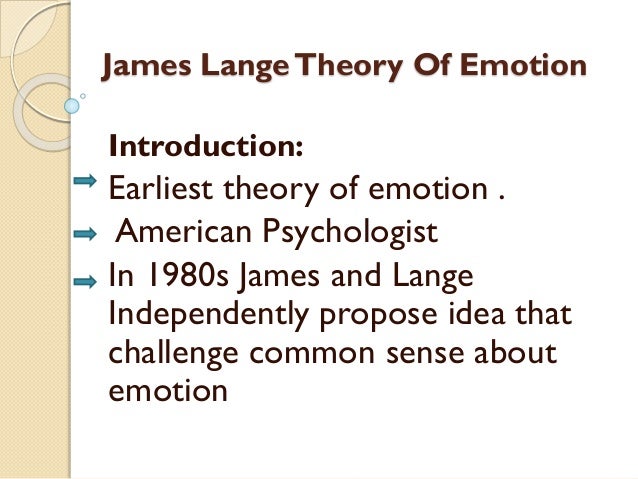

















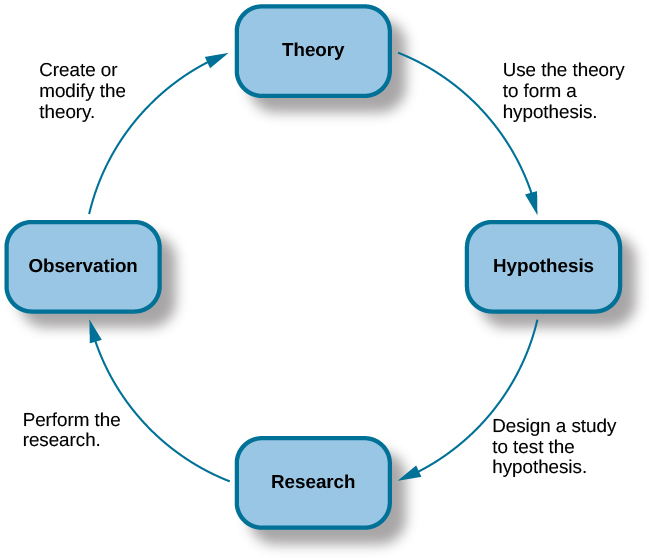
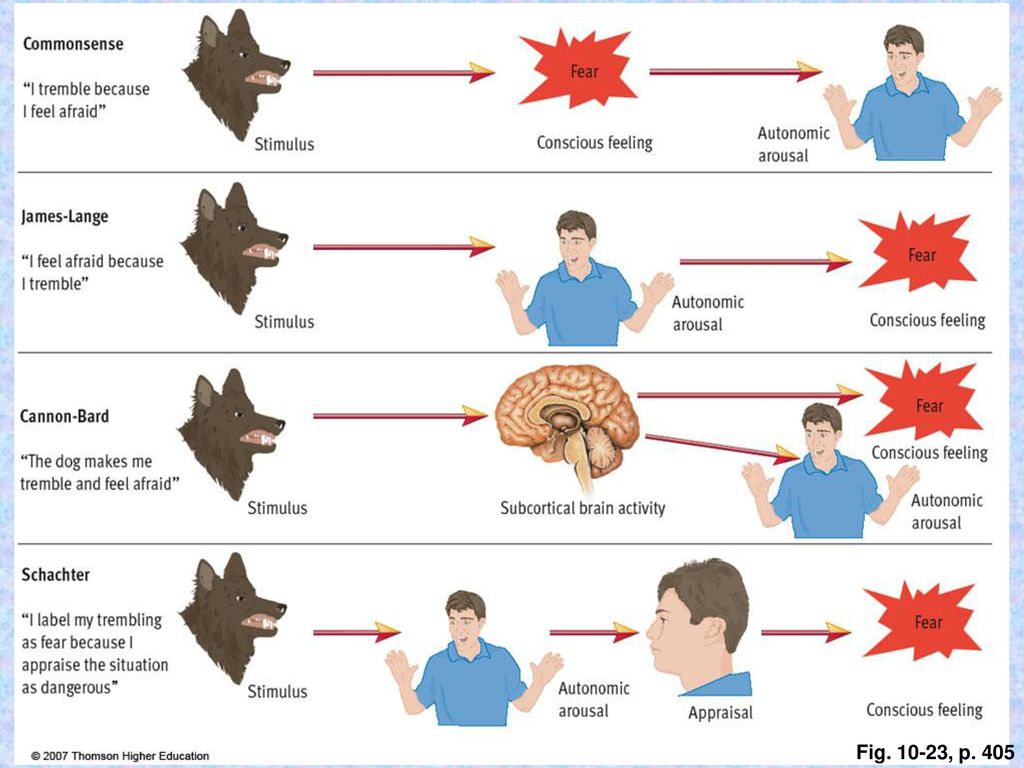

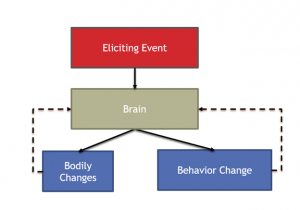








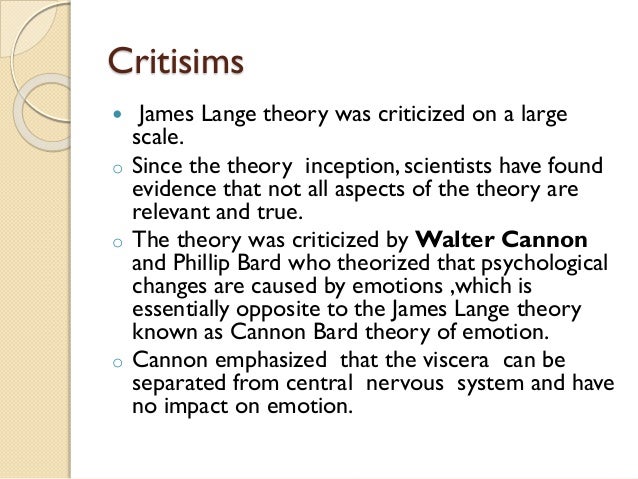
0 Response to "40 james lange theory diagram"
Post a Comment